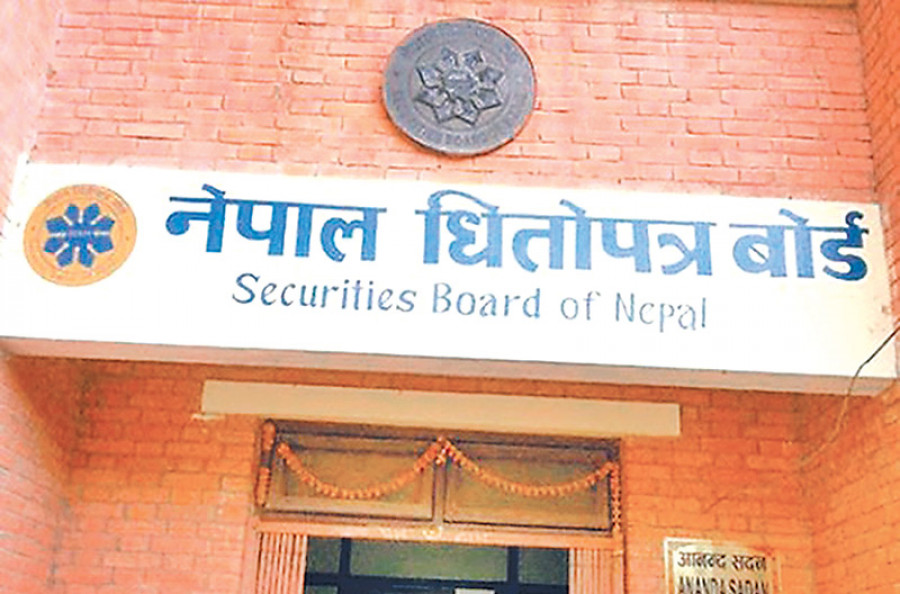Experts suggest facilitating blended finance

By Modnath Dhakal
Kathmandu, July 14: Stakeholders have suggested developing and utilising blended financing mechanism in a way that it could attract investment from foreign investors, philanthropic organisations and domestic private sector, which has long been a critical issue for Nepal despite having satisfactory policy provisions.
Speaking at a discussion on 'Draft of Blended Finance and Investment Bylaws, 2077' organsied by the Securities Board of Nepal (SEBON) on Tuesday, experts said that a policy guideline was immediately needed to facilitate blended finance.
Blended finance is the strategic use of development finance and philanthropic funds to mobilise private capital flows to emerging and frontier markets, according to the World Economic Forum.
"It’s about attracting fund from the public sector and philanthropic organisations to motivate private sector investment in critical projects in business and development," said Professor Dr. Achyut Wagle, presenting a paper at the programme organised virtually.
"Blended finance deliberately channels private investment to sectors of high-development impact while at the same time delivering risk-adjusted returns," he added.
He said that the new mechanism could help in meeting the need of more than US$17 billion to meet the financing requirement for the Sustainable Development Goals (SDGs) for Nepal.
According to him, it uses catalytic public (government and ODA) and philanthropic capital to mobilise additional private capital to projects that help achieve the SDGs and expect a positive financial return.
But Prof. Wagle maintained that the mechanism must have state ownership and there should be an effective institutional arrangement and engagement of stakeholders.
"Dedicated cells at the Ministry of Finance, Nepal Rastra Bank and Investment Board of Nepal could be the first step towards it. Likewise, a forum should be created to engage stakeholders like the Federation of Nepalese Chambers of Commerce and Industry, Confederation of Nepalese Industries and Nepal Chamber of Commerce," he said.
He also suggested taking this modality of investment down to the local levels.
“PPP Act and bylaws in Nepal can help in blending finance from the public and private sectors. It can be a way to the full implementation of blended finance,” said Prof. Wagle.
Then Finance Minister Dr. Yuba Raj Khatiwada had included this option in his budget in 2018 saying that 'blended financial resources will be mobilised in the production of electricity'. Budget of the current fiscal year 2020/21 has also included promoting this financing instrument to attract more investment.
The draft of the bylaws includes provisions on capital structure of the project operated under blended finance, framework for risk distribution, issuance of equity shares, fund manager, accounting measures, distribution of return and other pertinent issues.
Participants and promoters of the blended finance system include government and public institutions, national and international donor organisations, development banks and financial institutions, non-government, philanthropic and civil society organisations, consumer committees, international financial institutions, foreign direct investors, non-resident Nepalis, cooperatives, multinational companies, institutional investors like banks, pension funds and insurance and professional investors.
Presenting the major elements of the draft, Deputy Executive Director of SEBON, Dr. Nabaraj Adhikari, said that the focus of government and regulator should be on facilitating the private sector.
There should be better and effective coordination with the IBN and Department of Industry, he said.
Financial consultant Joseph Silvanus said that the policy instrument for the blended finance should be made simple. "It should demystify the concept that it is only for the Foreign Direct Investment-based large projects," he said.
Chairman of SEBON Bhisma Raj Dhungana said that blended finance could reduce the dependency of Nepal on development financing. The bylaws will help in managing investment for development projects through the capital market as well, he said.
Recent News

Do not make expressions casting dout on election: EC
14 Apr, 2022
CM Bhatta says may New Year 2079 BS inspire positive thinking
14 Apr, 2022
Three new cases, 44 recoveries in 24 hours
14 Apr, 2022
689 climbers of 84 teams so far acquire permits for climbing various peaks this spring season
14 Apr, 2022
How the rising cost of living crisis is impacting Nepal
14 Apr, 2022
US military confirms an interstellar meteor collided with Earth
14 Apr, 2022
Valneva Covid vaccine approved for use in UK
14 Apr, 2022
Chair Prachanda highlights need of unity among Maoist, Communist forces
14 Apr, 2022
Ranbir Kapoor and Alia Bhatt: Bollywood toasts star couple on wedding
14 Apr, 2022
President Bhandari confers decorations (Photo Feature)
14 Apr, 2022










